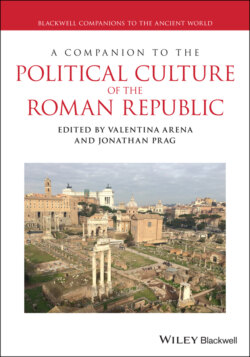Читать книгу A Companion to the Political Culture of the Roman Republic - Группа авторов - Страница 60
5.3 Virtuous Politics
ОглавлениеFrom the early days of the Revolution, American patriots evaluated and defined public action in light of the lessons of antiquity, particularly of Rome. With the connection to the Mother Country gradually but surely eroding during the decade following the Stamp Act of 1765, American patriots put their classical imagination to constant use. The world of classical civilisations rendered itself particularly meaningful by providing paradigmatic examples of republican ideals and standards of conduct, with Rome being especially useful, having its own political discourse of exemplarity. Patriots turned repeatedly to the classical republican societies, first and foremost to Rome, in order to define their own republicanism and to situate their ideologies in a historical context. However, revolutionaries did not perceive republicanism merely as an ideology, or as a model structure of government or political system; rather, they understood it as a well-defined and tested attitude toward political life. Such an attitude was based on public civic virtue, a political mode of action that historically originated in classical antiquity.
The foundation of such virtue, which lay at the core of a republican society, was the ancients’ stress of liberty as in-dependence, and hatred of tyranny (on this issue, see Nelson 2014). In the emerging American political imagination only an autonomous, self-sufficient yeoman (an unattainable fantasy, to be sure), who would bear arms to protect his republic, was deemed truly free (for the origins of this concept of liberty, see Skinner 2012). Accordingly, many of the countless references to Rome in revolutionary America involved examples of the noble sentiments that underlay that glorious commonwealth of the past. The historian Henry Steele Commager has pointed out that ‘the scorn of luxury and effeminacy and the acceptance of austerity; the preference for the rural life … the eloquence … the devotion to the law; the dedication to public service; the sense of honor and dignity and virtue – all of this was American as it was Roman’ (Commager 1971: 10). This Roman-American defiance played out in the wake of the Revolution through classical exempla intended to educate and inspire the American public.
Patriot writers attempted to buttress their revolutionary action by inculcating a classical civic virtue. Only thus may we understand their constant allusions to classical history, frequently Greek but much more often Roman, and ancient glory. A characteristic revolutionary writer in the Virginia Gazette, wishing to ‘secure this valuable blessing [of classical virtue], and learn the greatness of its worth’, recommended to his ‘countrymen, especially the younger part of it, a thorough acquaintance with these records of illustrious liberty, the history of … Rome’. The writer intended this recommendation not as a theoretical or academic exercise, but rather as a spur to urge Americans to ‘a glorious emulation of those virtues, which have immortalized their names’. Classical examples would surely instil Americans with ‘a just hatred of tyranny and zeal for freedom’ and induce them to follow ‘the godlike actions of those heroes and patriots, whose lives are delivered down to us by Plutarch’ (see Chapter 12).2
On the northern end of the continent, New Englanders too conceived of liberty in classical terms and performed as a classical act. ‘Cato of Utica’, a Bostonian styling his literary persona as the ideal type of classical republicans, Cato the Younger, told his audience that ‘the heroic ages were the most free, and in proportion to the progress of tyranny, pusillanimity and barbarism have prevailed…liberty invigorates the spirit and refines the understanding, while slavery debilitates the one, and rapines the other’.3 Endeavouring to make clear how well Bostonians, suffering from the economic consequences of the Intolerable Acts, were situated on the spectrum of freedom and tyranny, another writer from New Hampshire deemed that they ‘in general have that fortitude which did honor to the ancient Romans’.4
Patriot writers kept returning to the narratives and patterns supplied by the liberty-loving Romans for deductive moral lessons and shared a classical dislike of the symbols of tyranny. ‘A Commonwealth’s Man’ from New Hampshire characteristically praised the ‘simple language’ of the Romans and their self-effacement in order to attack titles and aristocratic appellations, ‘the offsprings of monarchical or arbitrary governments’. ‘The Roman Senate’, the writer pointed out, ‘in the height of its glory and happiness, had no other title than senatus populusque romanus, that is, the senate and people of Rome. Scipio was addressed by the name of Scipio at the head of his army…Let us leave the titles of excellency [to the] servants of the king of Britain.’5
In such light it is not hard to appreciate why not only the Revolution’s leaders but even ‘the common sort’ were valorised as classical ancients. A nameless ‘mechanic’ who asserted in 1774 that he would prefer to eat acorns in the forest rather than submit to British tyranny, extracted from William Tudor a classicised praise: ‘What a Roman! By Heavens, I glory in being this Man’s fellow Citizen’ (Richard 1994: 119).
Nomenclature and imagery were among the most salient modes through which patriots demonstrated their commitment to the world of classical antiquity. Political institutions such as ‘congress’ and ‘senate’, state and federal seals and emblems, townships, paper money and coins, all involved classical titles and imagery ‘on an unprecedented scale’ during the separation from the British Empire (Sellers 1994: 11–19).6 As the historian Caroline Winterer points out, late eighteenth-century American neoclassical prints of images, such as the goddesses Liberty and Minerva, stand out as strikingly new and strikingly political (Winterer 2005: 1265). It was a modern and revolutionary politics that drew its inspiration and ideology from the long-gone world of the Roman Republic.
